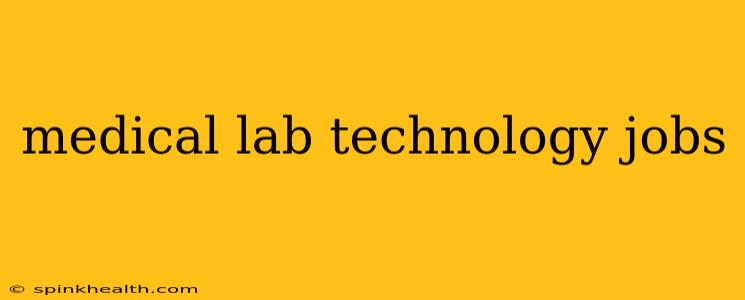A World of Opportunity: Exploring Careers in Medical Lab Technology
The world of medical lab technology is a hidden powerhouse, quietly driving advancements in healthcare and shaping countless lives. It's a field brimming with fascinating challenges, cutting-edge technology, and a profound sense of purpose. Forget the sterile image – this is a dynamic career path with diverse opportunities for those with a passion for science, precision, and making a real difference. Let's delve into the exciting possibilities within medical lab technology jobs.
My name is Dr. Evelyn Reed, and for over 20 years, I've worked as a pathologist and witnessed firsthand the incredible contributions of medical laboratory professionals. My aim is to paint a vivid picture of this rewarding career field, highlighting its various facets and answering some frequently asked questions.
What are the different types of medical lab technology jobs?
The beauty of this field lies in its variety. It's not just one type of job; it's a constellation of roles, each crucial in ensuring accurate and timely diagnoses. You might find yourself:
-
Analyzing blood samples: As a Medical Lab Technician (MLT) or Medical Lab Scientist (MLS), you'll be at the heart of the diagnostic process, performing a vast array of tests, from basic blood counts to complex molecular analyses. Your precision and attention to detail are vital in identifying infections, monitoring disease progression, and guiding treatment decisions.
-
Operating sophisticated equipment: Medical Laboratory Technicians and Scientists are highly skilled in operating sophisticated instruments like automated analyzers, microscopes, and DNA sequencers. Mastering these tools is key to accurate results and efficient workflow. The field is constantly evolving, requiring continuous learning and adaptation to new technologies.
-
Research and development: For those with an advanced degree, opportunities exist in research and development, contributing to groundbreaking advancements in diagnostics and treatment. This involves designing new tests, improving existing methods, and pushing the boundaries of medical science.
-
Quality control and management: Ensuring the accuracy and reliability of lab results is paramount. Roles in quality control and laboratory management are crucial, overseeing procedures, maintaining standards, and guaranteeing the integrity of the entire process.
What education and training are needed for medical lab technology jobs?
The educational path varies depending on the specific role you aim for. Many Medical Lab Technicians earn an associate's degree in Medical Laboratory Technology, followed by certification through organizations like the American Society for Clinical Pathology (ASCP). Medical Lab Scientists typically hold a bachelor's degree in Medical Laboratory Science or a related field, also often followed by certification. Advanced roles, such as research positions, often require master's or doctoral degrees.
What is the job outlook for medical lab technology?
The demand for skilled medical lab professionals is consistently strong and projected to grow. The increasing complexity of medical care, the aging population, and the rise of chronic diseases all contribute to this demand. Opportunities exist in hospitals, clinics, private labs, research institutions, and pharmaceutical companies. With the ongoing advancements in technology and the growing need for precise diagnostics, the future of medical lab technology is exceptionally bright.
What are the salary expectations for medical lab technologists?
Salaries vary based on experience, location, and educational level. However, medical laboratory professionals generally earn competitive salaries, reflecting the high skill level and critical nature of their work. Entry-level positions are well compensated, with significant potential for salary growth as experience and qualifications increase. Advanced roles and specialized expertise often come with even higher earning potential.
What are the daily tasks involved in a medical lab technology job?
A typical day might involve preparing samples, operating analytical instruments, performing quality control checks, analyzing results, documenting findings, and collaborating with other healthcare professionals. It’s a demanding yet highly rewarding role that directly impacts patient care. The work environment is typically a collaborative one, involving teamwork and communication with other lab personnel and healthcare professionals.
In conclusion, a career in medical lab technology is a rewarding and meaningful path for individuals passionate about science and making a direct impact on healthcare. The field is dynamic, diverse, and offers plentiful opportunities for growth and advancement. With its combination of intellectual challenge, cutting-edge technology, and tangible contributions to patient care, it's a career path worth exploring.

